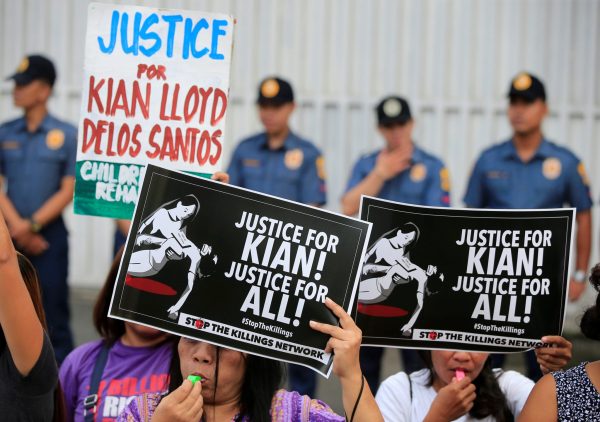Since beginning his war on drugs shortly after taking office in June 2016, the president’s support of the police has never wavered. He promised to take full responsibility for drug-related deaths and pardon cops convicted of criminal offences in the drug war. Until last month.
‘There should be an investigation,’ the president said, referring to cops involved in the killing of a 17-year-old boy, Kian Loyd Delos Santos. ‘There will be no whitewashing,’ he promised.
Eye witnesses testified to seeing three police officers grab the boy from a store near his home and drag him away to an alley where he was shot. CCTV footage corroborates this claim. Paraffin tests belie the police’s claims that the boy shot at them first.
Kian’s death set in motion a series of protests across Manila. Students and human rights groups marched to the People Power Monument to call for an end to the killings. And hundreds marched with Kian’s family as they made their way to the public cemetery.
But is this a breaking point for Duterte’s bloody war on drugs? Unlikely.
The president’s response did create a space to hold erring cops accountable to police brutality. But it also reinforces the premise that the bloody war on drugs is an appropriate government policy — the issue is a few bad men, not the policy itself.
Decades of sociological research illustrate the power of broader institutional cultures in shaping individual behaviour. In Sheila Coronel’s chapter in the recently published book The Duterte Reader, she focuses on the role that an existing culture of police brutality and corruption has played in the drug war. For Coronel, Duterte’s bloody purge of drug offenders has been possible only because the Philippine National Police offered a ‘ready, willing, and able killing machine’. And it is ‘therefore not surprising that the modes of killing employed in the anti-drug campaign — shooting by hooded gunmen riding on motorcycles or strangulation by cords or wires — are reminiscent of executions past’.
Duterte is not the first Filipino politician to use the police as a blunt instrument to achieve particular aims. For decades, successive generations of police have learnt that the best way to advance their careers is to cosy up to politicians. They are left with little choice but to find entrepreneurial opportunities to make a profit due to their meagre salaries.
What’s more, poor training and a dysfunctional criminal justice system make it difficult for cops to do their job properly. Rarely are they successful in gathering evidence, securing eye witness testimonies and filing cases. Consequently, under pressure to demonstrate progress being made in the drug war, they are pushed to find legal workarounds and often resort to illicit methods of ensuring results.
‘The reality is’, Coronel adds, ‘illegal behaviour is embedded in the way the police operate’.
Relieving erring cops from their duties, launching investigations and punishing a few bad men may be a step in the right direction. But it will not be enough if broader institutional reforms that empower police officers to conduct their operations properly do not follow suit.
Nobody wants to be a butcher. But resisting institutional cultures can be challenging if alternative choices are limited. Reports have emerged about how killings have become part of rookie police officers’ ‘baptism by fire’ — a kind of initiation process — leaving new cops with little choice but to take part for fear of being sidelined.
If there is one lesson that can be learned from this bloody war, it is that institutions are bigger than the strongman.
Nicole Curato is an Australian Research Council DECRA Fellow at the Centre for Deliberative Democracy and Global Governance, the University of Canberra. She is the editor of the recent book The Duterte Reader. Follow her on Twitter at @NicoleCurato.

